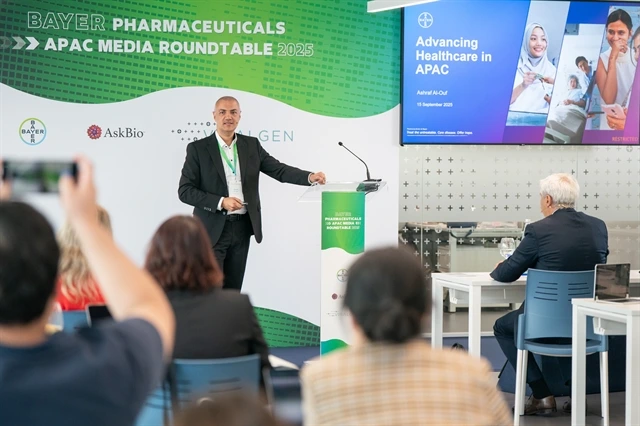

Image Credits: Veitnam News
The self-owned life science Germany-based company Bayer renewed its commitment to advance and strengthen healthcare solutions for the Asia Pacific (APAC) patient population, consisting of Vietnam, with different patient needs and unique healthcare landscapes. With this reaffirmed dedication, the company focuses on leading the healthcare innovation in the areas by providing groundbreaking treatments and identifying the region’s emergency medical needs. In the two-day annual Bayer Pharmaceuticals APAC media conference in San Sebastian, Spain, Bayer mentioned its preparedness to identify the expanded range of healthcare problems beyond cardiovascular disease. Bayer’s product portfolio for proper regional markets involves innovative therapies in areas such as ophthalmology, radiology, women’s health, and oncology.
Head of pharmaceutical commercial operations in Asia-Pacific at Bayer, Ashraf Al-Ouf, said, “Following the concerned projection, we are empowered to identify healthcare needs and introduce new therapeutic alternatives for patients throughout the region in South Asia, Southeast Asia, Oceania, and East Asia.”
At the roundtable conference, Bayer unveiled its elevating initiatives in clinical research and pharmaceutical innovation with 34 recent clinical trials in the specific region, reflecting its commitment to enhancing patient outcomes and advancing medical research. The company spotlighted its prominent investment in powerful research, especially in gene and cell therapies.
Aligning with the initial investments in these technologies, the company’s drug development portfolio in gene and cell therapies has extended to involve various programmes at different stages of development, ranging from preclinical to improved clinical stages. Also, cardiovascular diseases are major research areas in gene and cell therapies featuring rare diseases, ophthalmology, and neurology.
The year 2025 is a transforming year as Bayer paces in treating patients suffering from parkinson’s disease by instigating gene therapies and investigational cell therapies. Currently, the investigational gene therapy is in clinical phase 2, which has gained the regenerative medicine advanced therapy designation from the Food and Drug Administration (FDA). Recently, investigational cell therapy has positioned itself as such is stepping ahead with enrolling its first patients for the phase 3 clinical study, alongside Australia is one of the countries in the Asia-Pacific region engaged in this trial.
Bayer has achieved a prominent milestone with the FDA’s fueling designation for an investigational cell therapy focusing on certain forms of inherited retinal disease. To improve development and research activities, Bayer has uplifted its collaborative strategy with local authorities and partners.